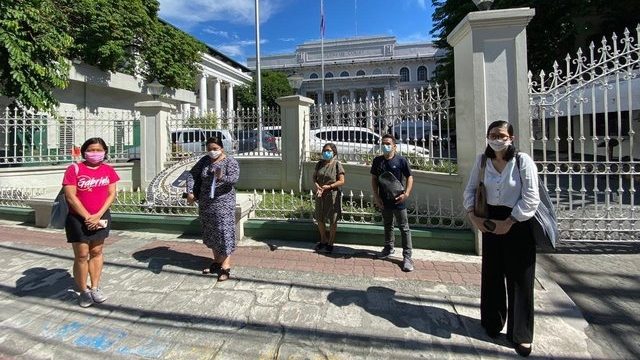SUMMARY
This is AI generated summarization, which may have errors. For context, always refer to the full article.

The Supreme Court en banc has junked a novel petition that sought to compel the Duterte government to implement coronavirus mass testing in the country, saying it cannot “dictate how another branch of government should do its job.”
“The petition is dismissed for failure of petitioners to show that they are entitled to the issuance of a writ for mandamus,” said a 4-page notice resolution dated September 1 but received only by petitioners on Wednesday, September 16.
The voting was 13-1-1, with Associate Justice Marvic Leonen dissenting, and Associate Justice Priscilla Baltazar-Padilla on leave.
The petition was filed on July 3 by 11 individuals led by former social welfare secretary Judy Taguiwalo, represented by the National Union of Peoples’ Lawyers (NUPL).
They asked for a writ of mandamus, an extraordinary writ that will compel a body or a person to do a legal duty.
It was the petitioners’ theory that the Duterte government was not doing its legal duty under Article II, Section 15, of the Constitution which says that “the State shall protect and promote the right to health of the people and instill health consciousness among them.”
For the Court, mandamus will only work if there is no other remedy available. The Court said mandamus cannot “direct the exercise of a judgment or discretion in a particular way.”
“While the Constitution enjoins respondents to protect the right to health, mandamus will not lie to compel them to exercise said protection in a certain way or to a certain degree,” said the Court.
“The job of the Court is to say what the law is, not dictate how another branch of government should do its job,” it added.
The Court also said that petitioners could have first exhausted their remedies before government agencies like the Department of Health (DOH).
“Without a demonstration that an official in the executive branch failed to perform a mandatory, non-discretionary duty, courts have no authority to issue a writ of mandamus, no matter how dire the emergency,” said the Court.
A comment at least
The High Court dismissed the petition without requiring comment from the Duterte government, similar to what it had done with the denied petitions to compel President Rodrigo Duterte to disclose his state of health, and to declare the Bayanihan To Heal As One Act I as unconstitutional.
Leonen dissented because he would have wanted a comment from government first, saying that a novel case such as this deserved a full decision and not a mere minute resolution.
“A ruling on these issues will have a significant impact on the social, political, and economic life of the nation. That alone should have prompted this Court to at least require respondents to file a comment without necessarily giving due course to the Petition. A comment would have given a fuller exposition of the constitutional issues raised, this time from respondents’ view,” said Leonen.
Leonen said “the issues are important and have far-reaching implications,” even citing the young law, Republic Act No. 11332 or the Mandatory Reporting of Notifiable Diseases and Health Events of Public Concern Act to demonstrate how the DOH has a duty to respond to the health needs of the people.
So far, the Duterte government has been using RA 11332 to arrest and detain people who go out despite quarantine rules, many of them activists who are either outside for rallies or outreach programs.
“Notably, the issues involved are of transcendental importance, this case is of first impression, the time element cannot be ignored, and the Petition includes questions that are dictated by public welfare,” said Leonen. (READ: During pandemic, Supreme Court favors Duterte twice and makes others wait)
‘Rights up in the air’
Since the petition was filed, the Philippines has reached a testing capacity of 30,000 to 40,000 samples per day.
In a statement on Wednesday, the NUPL said the denial of the petition “regrettably leaves the people’s right to health and to information up in the air.”
Their petition had pleaded the Court to treat it as a case of first impression, and for the “Court to fix specific standards in addressing a public health emergency that conforms with constitutional and international human rights.”
The petition, citing the Reproductive Health Law decision, argued that Article II, Section 15, of the Constititon is a self-executing provision. Self-executing provisions are those that do not need an enabling law to be effective and implemented.
The NUPL said that the government is continuing to neglect its duty as seen by the heavy dependence on a coronavirus vaccine. Duterte had said in a televised speech last August that there cannot be a recovery roadmap without a vaccine.
“The government is counting not on itself and what it can do to arrest the health crisis once and for all, but on coronavirus vaccines from other countries that have yet to come,” said the NUPL.
The Philippines is conducting 26.41 tests per 1,000 population, according to Our World in Data. It’s one of the highest in the world, but that’s also because the Philippines has a growing number of infections, with 269,407 confirmed cases as of Tuesday, September 15. – With reports from Sofia Tomacruz/Rappler.com
Add a comment
How does this make you feel?

![[Rappler’s Best] US does propaganda? Of course.](https://www.rappler.com/tachyon/2024/06/US-does-propaganda-Of-course-june-17-2024.jpg?resize=257%2C257&crop=236px%2C0px%2C720px%2C720px)



There are no comments yet. Add your comment to start the conversation.